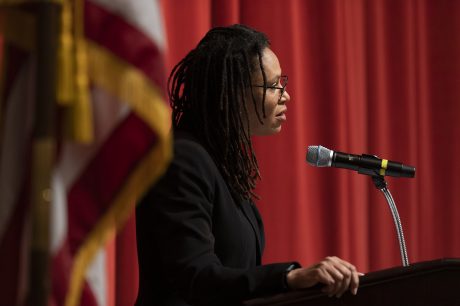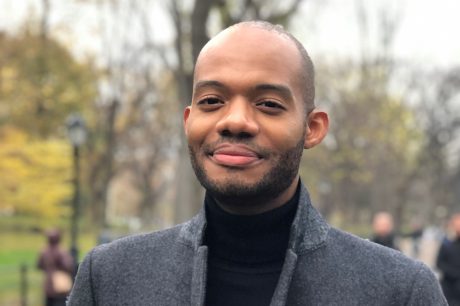On April 1, 1992, the Senate Judiciary Committee convened to decide whether Alabama Assistant Attorney General Ed Carnes should become a judge on the US Court of Appeals. For 11 of the 16 years he worked as a government lawyer, Carnes had run the state’s unit that litigated cases of capital punishment. Usually Supreme Court nominations generate the most attention. But in the case of Carnes, the stakes were high: Judges on the 11th Circuit have responsibility for the interpretation of the law in Georgia, Alabama, and Florida—former slaveholding states with a long history of unequal justice.
That day, Carnes’s own testimony fanned the flames of controversy. Under oath, Carnes vigorously denied that racism existed in the criminal justice system. Asked by Democratic Senator Howell Heflin about the large number of African Americans on death row in Alabama, he replied, “I do not believe that capital punishment is applied in a racially discriminatory manner in Alabama or in the Nation.” Instead, he attributed the lopsided proportion of minorities on death row to “economic disparity and hardship, and also the deterioration of the family unit.”
Against Carnes were assembled both traditional civil rights groups and prominent human rights leaders, including the Southern Christian Leadership Conference (SCLC), the NAACP, the NAACP Legal Defense Fund, Coretta Scott King, and Rev. Jesse Jackson. “The civil rights community is solid in their opposition to Carnes,” declared Dr. Joseph Lowery—a minister who had cofounded SCLC with Martin Luther King, Jr.—“more solid than they were in their opposition to Judge Clarence Thomas’s nomination to the U.S. Supreme Court.”
Despite intense opposition, Carnes, like Justice Thomas, was ultimately confirmed. He went on to serve nearly three decades before retiring in June 2020. Over those 28 years, he largely voted as one might expect a former prosecutor would in criminal cases. In 2012, Carnes wrote an opinion upholding the death sentence of Robert Holsey, an indigent Black man who killed a sheriff’s deputy. Holsey’s court-appointed lawyer drank a quart of vodka every night during the trial and failed to introduce evidence that Holsey struggled with an intellectual disability and had been abused by his own mother. Over sharp dissent from a colleague—that omitting this “horrific” evidence denied Holsey competent representation—Judge Carnes refused to order a new trial, saying that having a sober lawyer would not have made a difference. Holsey was executed by the state of Georgia in December 2014. Carnes continued to make it easier for people to be put to death, even when confronted with evidence of unequal justice and with the condemnation of his colleagues.
Over the years, federal judges have played a major role in facilitating War on Crime policies. The story of how Carnes became a judge offers crucial lessons for those who hope to unwind the policies of mass incarceration.
For reformers, it remains absolutely essential to build on past efforts to pierce the myth of judicial neutrality, and to question a nominee’s likely judicial philosophy. Nominees whose philosophy or life experiences reveal hostility or indifference to the ideal of equal justice will likely read the Constitution’s guarantees restrictively. They might also undermine legislation intended to ensure fairness and access to justice, upsetting fragile political compromises and coalitions along the way.
The showdown over Carnes’s nomination is also important because of the hard-hitting approach of one of his most prominent opponents: Stephen B. Bright. Having grown up in segregated Kentucky, Bright was a lifelong advocate for the poor and a fierce critic of racial discrimination. Trained as a legal aid lawyer and public defender, he had assumed the leadership of the Southern Center for Human Rights in Atlanta, representing poor people on death row and litigating prison conditions cases.
Leading the battle against the nomination, Bright and his allies showcased Carnes’s aggressiveness in defending death sentences. And they made sure to highlight that Carnes was eager to do so even when an impoverished person had a court-appointed lawyer who failed to provide competent representation, or when white prosecutors tried to eliminate Black jurors from trials involving Black defendants. Bright worried that Carnes would be a “hanging judge”: a tough-on-crime prosecutor who carried that same mission with him onto the bench. In Bright’s experience, hanging judges looked the other way when prosecutors ran roughshod over the rights of the accused. Bright was used to dealing with elected judges like these, but this fight was different. Once confirmed as a federal judge, Carnes would have the power to entrench War on Crime policies for decades to come.
Lastly, the debate that ensued over the Carnes nomination raised a basic question about what we mean by “equal justice”: Do Americans simply want judges who themselves are not biased or judges who will take responsibility for the wrongdoing of other members of the community? Carnes’s defenders insisted that he was not a racist, merely very conservative, and that political disagreement was not a good reason to oppose him. But his detractors, including Bright, argued that Carnes’s “ruthless” pursuit of capital punishment and blindness to structural inequality revealed a character flaw. Carnes might not have hatred in his heart—but he would be unwilling to remedy injustices perpetrated by others.
In June 1991, legendary judge Frank Johnson announced that he would retire on his birthday, October 30. Quickly President George Bush tapped Carnes, a graduate of Harvard Law School, for the vacancy. After hearing the news, Stephen Bright “went ballistic,” believing that confirmation of Bush’s choice would be a setback for equal justice. “I find it to be an interesting commentary on the times,” Bright told the press, “that what brings a person to the attention of the Justice Department is someone whose entire professional life is devoted to the execution of poor people.”
The selection of Carnes was all the more insulting to people like Bright because Frank Johnson had earned a reputation for treating litigants fairly and for courageously enforcing the Constitution’s guarantee of equal justice under law. Perhaps most important, he was willing to endure social ostracism, consistently ordering the desegregation of Alabama’s schools and public accommodations, even in the face of segregationist resistance from his law school friend Governor George Wallace.
In one of his final rulings before stepping down, Judge Johnson had overturned a death sentence in a case handled by Bright. Johnson ordered a new trial for Jimmy Lee Horton, a Black man, because the prosecutor had struck all the Black citizens from the jury pool and Horton’s court-appointed lawyer failed to provide competent representation.
By contrast, argued Bright, Carnes’s commitment to equality was woefully insufficient. Bright’s staff had litigated several cases against Carnes’s death penalty unit and believed the staff did everything to speed executions, even when the condemned might be intellectually disabled or serious allegations of racial bias during trials had been raised. Moreover, Carnes had even served as a leader in Republican efforts to change law to make it harder for prisoners to challenge their convictions in federal court.
Still, scuttling the nomination would not be easy. Some civil rights figures stayed silent because they worried that the effort to derail Carnes’s nomination would fail. And if they antagonized him, then he might later retaliate against their clients from his new perch on the federal appeals court.
Complicating matters further, Carnes was vocally endorsed by Morris Dees, President of the Southern Poverty Law Center. Dees had gained notoriety in the 1980s by filing lawsuits against the Ku Klux Klan and a ragtag assortment of hate groups, in an attempt to try to bankrupt them. That strategy had turned SPLC into a household name and brought donations flooding in. (Dees once promised that he was going to stop fundraising when he reached $50 million. By 2018, SPLC’s assets would eventually top $477 million.)
Even so, Dees had not used that success to further the center’s original mission: supporting poor people facing unequal justice. Instead, he had decided to shut down SPLC’s anti-death penalty unit. Why help poor people already in prison, he seemed to be saying, when programs like Klanwatch were so much more lucrative? Many lawyers for the poor found it unforgivable for SPLC to be siphoning resources away from programs that helped desperate people. Clive Stafford Smith had been in the trenches as a young capital defense lawyer and heard stories about the bloodletting. “When the going got tough, Morris got out,” he said ruefully. “That’s truly pathetic.” In 1985, Dee’s entire legal staff resigned over SPLC’s priorities.
By the time of Carnes’s nomination, SPLC had amassed “a war chest of about $125 million and they are doing nothing with it,” recalled Bernard Harcourt, former lawyer for Equal Justice Initiative (EJI) in Montgomery and now a professor at NYU Law School. “At that moment in time, they were out of the business of doing good and into the business of raising money based on the fear of hate.”
Now, to top it all off, Dees was vocally supporting the nomination of a lawyer who had defended tainted criminal sentences and expanded the number of people of color facing execution. Bright felt that Dees’s portrayal of Carnes “as a foe of racial discrimination” was “preposterous.”
By this time, Bright had honed an “interventionist model” in criminal justice matters. Representing clients facing serious charges in Southern courthouses, he learned that being an excellent courtroom lawyer was not enough; a reformer had to take the fight to those prosecutors and judges who exploited flaws in the criminal justice system to advance their own careers. This is why Bright and his staff at the Southern Center for Human Rights added a grassroots component to their cases: inviting Black citizens to attend trials and encouraging concerned people to vote out judges who tolerated prosecutorial misconduct.
Thus, in 1992, publicly campaigning against a president’s nominee was a natural extension of the lessons learned against other hostile adversaries of equal justice. Indeed, during the confirmation fight, The Village Voice would dub Bright “Carnes’ chief nemesis.”
In the lead-up to the hearing, Harcourt worked with Bright doing “every possible thing we could to try to stop that nomination.” Burning the midnight oil after long days at EJI, Harcourt labored feverishly in Montgomery to document the parts of Carnes’s career that might be brushed under the rug while Bright worked the rooms in Washington, DC. Bright told a New York Times reporter that he didn’t think Carnes had a shot but for Dees’s “role in distorting and misrepresenting his positions.” To Bright, Dees was playing political patron rather than honest dealer. The uncomfortable truth for human rights advocates was: sometimes you must denounce allies who are willing to accept too little justice.
Meanwhile, President Bush weighed in from the Rose Garden: “Why so little concern for the victims and so much for criminals?” Bright was undeterred. He had a penchant for taking on unpopular causes; he had debated proponents of the death penalty such as William F. Buckley, Jr. on national television and had even gone toe-to-toe with Justice Scalia in the Supreme Court over what it meant to guarantee a fair trial. He now gladly stepped in front of the train once again, come what may.
The hearing before the Senate Judiciary Committee was full of stinging arguments and counterarguments. Carnes began by responding to criticism that he’d been unfair as a state prosecutor, noting that he had opened files to the defense when a district attorney had failed to turn over exculpatory evidence. He then made his extraordinary claims that the death penalty wasn’t racist because the law was formally neutral. A bespectacled graduate of Harvard Law School, Carnes had gained a first-class education on the intricacies of the legal system. Yet he had an exacting view of justice: Defending death sentences as aggressively as possible was nothing more than upholding the rule of law.
Dees spent his testimony seeking to deflect charges of Carnes’s racism. Yet he did so by focusing on the nominee’s personal behavior, observing that he “goes to an integrated church” and “has never belonged to a country club.” Otherwise, Dees praised Carnes for his “adherence to the rule of law,” which he said would “make him a judge cut in the mold of Judge Frank M. Johnson.”
Next, George Kendall testified on behalf of the NAACP Legal Defense Fund. He expressed concerns about Carnes’s lack of commitment “to the even-handed administration of justice.” Kendall described the case of Albert Jefferson, a Black man who was intellectually disabled. During postconviction litigation, memos surfaced showing the prosecutor had organized jury panels into four categories: “strong, medium, weak and black.” That smoking-gun evidence proved that race was on the prosecutor’s mind when he struck Black jurors from the trial. Yet on appeal, Carnes had urged the court “not even to reach the merits” of Jefferson’s equality arguments but instead to find the claim procedurally barred. Faced with an opportunity to do the right thing, Carnes instead insisted that the courts “enforce that order and allow that person to be executed.” To Kendall, this episode showed that Carnes was not interested in remedying obvious racial discrimination by fellow prosecutors.
Do Americans simply want judges who themselves are not biased or judges who will take responsibility for the wrongdoing of other members of the community?
When Bright’s name was called, he went in with guns blazing. He said that in “a number of cases” Carnes was guilty of “overreaching that … is far beyond what is appropriate for zealous advocates.” Bright then leveled a new, explosive charge: Carnes’s office often ghostwrote orders “which have been signed like blank checks by judges.” One judge even copied the state’s draft orders word for word in four different cases sentencing people to death. To Bright, the rampant use of ghostwritten orders suggested that judges were either biased in favor of prosecutors or not paying attention to the evidence, just rubber-stamping the state’s portrayal of the facts. If Carnes’s legal staff engaged in such tactics, Bright argued, he was sure to encourage coziness with prosecutors or callousness toward poor people when he became a judge.
Bright next assailed Carnes’s opposition to improving the indigent defense system. The Constitution required that people too poor to afford their own lawyer be provided one free of charge, but the states had wide latitude in deciding how to comply. Few jurisdictions created public defender offices, and most others would appoint local lawyers who might not have any experience in criminal law. And the Supreme Court had never required states to furnish a lawyer to a poor person convicted under state law who hoped to get a hearing before a federal judge. Partly due to Carnes’s opposition, Alabama never contributed a penny to the state’s capital resource center, which represented indigent people on death row, so it had to operate based solely on federal funding. Those funds would eventually run out, leaving Alabama’s poor without adequate legal representation when they were facing imminent execution.
“Mr. Carnes is a specialist,” Bright told senators. “This is all he has done, and he has done it exceptionally well.” Of course, “he is up against lawyers who are court appointed. In post-conviction cases, they are paid $600 a case, as compared to the $95,000 that Mr. Carnes makes.”
It took gall, then, to appear before the American Bar Association Task Force, as Carnes had, and oppose the creation of uniform standards for appointed counsel that might be adopted across the country. The Supreme Court has ruled that the Sixth Amendment ensures adequate representation, but that standard was exceedingly low; federal courts routinely validated convictions when a court-appointed lawyer did little investigation or in-court advocacy. The ABA, appalled at the quality of representation for poor people in death penalty jurisdictions, stepped in to try to lift the standards, but Carnes had rejected such efforts as intruding upon the state’s prerogatives. The nominee’s testimony to the Senate committee now—that the quality of capital representation in Alabama was fine—“is just not accurate and it is not true,” Bright thundered.
Addressing the senators, Bright argued that Carnes systematically “exploited the poor quality of representation defendants received at the hands of their court-appointed counsel by arguing that vindication of the Bill of Rights is precluded because of the inept representation these defendants received.” Outside of the courtroom, Carnes worked hard to keep the justice system structurally unequal by ensuring that the state continued to provide shoddy lawyers to poor defendants. Then, inside the courtroom, he sought to get people killed faster based on technicalities, arguing that errors by those overmatched lawyers could not be addressed on appeal.
Bright also pushed back against the effort by fellow Southerners to make it “appear that Mr. Carnes has been a hero of the civil rights movement,” noting, “there is no mention of scores of cases in which Mr. Carnes defended the day-to-day racial discrimination that is so much part of the criminal justice system.”
For instance, Carnes fought for the execution of Horace Dunkins, a Black man with “an IQ of 65 and the mental age of a 10- to 12-year-old child,” even though his inept lawyer never told the jury about his intellectual disability. Carnes’s unit also defended the conviction of a Black vet, Herbert Richardson, where the prosecutor had urged death in part because he was allegedly “connected with” Black Muslim organizations. Arthur Jones, another Black man executed in 1986, was given a lawyer who made no opening statement at trial on his behalf, offered no mitigating evidence, and gave no closing urging the jury to spare him. Kenny Magwood, an intellectually disabled Black man, received a death sentence from an all-white jury after the prosecutor struck all the Black jurors; Carnes defended that conduct too. “With regard to this pervasive practice of exclusion on the basis of race,” Bright insisted, “Mr. Carnes has simply been part of the problem, not part of the solution.”
Senator Heflin, one of Carnes’s patrons, pointed to a letter from Dees to Dr. Lowery that asserted, in somewhat strained fashion, that Carnes “had a stronger record on civil rights than Frank Johnson had when he was first appointed to the Federal bench.” He also noted that Johnson had voted to uphold several death sentences.
Yet Bright stated that Dees “leaves out all the other cases that Judge Johnson considered, many times that many, in which constitutional violations were found.” He told Senator Heflin, “In most counties … it is as if there is a whites only sign hanging on the jury box.” Bright insisted that “day-to-day race discrimination” was still very much “a part of the system in Alabama, and Mr. Carnes is very much responsible for that.”
Bright’s performance had lit up the room—a model for hard-hitting, substantive testimony on a nominee’s record. “You are a great witness,” said Senator Hank Brown, a Republican from Colorado. “I have heard of questioners leading the witness, but I have not often heard of witnesses leading the questioner.”
The battle lines had been drawn and each side’s rhetorical positions staked out. On May 7, the Senate Judiciary Committee voted 10–4 to recommend that Carnes be confirmed. But progressive mobilization was just heating up and led to a delay on further Senate action until the fall.
Floor debate over the nomination commenced on September 8, 1992. After Senator Strom Thurmond touted Carnes’s public service and support within his home state, Senator Joe Biden approached the podium.
For his part, Biden took credit as author of a bill that “reinstates the death penalty for literally scores of offenses.” Nevertheless, he said that “the propriety of the death penalty” was not at issue, but rather “the integrity of our justice system.” For Biden, “the presence of race discrimination in a courtroom so undermines the promise of justice that we cannot and should not tolerate it in any form, to any degree, at any time.” Although he hailed from a state whose citizens favored the death penalty, he vowed to vote “no” on confirming Carnes.
In Biden’s view, a judge or prosecutor bore “a special responsibility not merely to withhold from practicing race discrimination themselves but to work actively to prevent its occurrence and to condemn its presence if and when it occurs.” Racial discrimination “must be fought not merely with words but with actions, and with real sanctions.” Biden faulted how Carnes “responded when confronted with race discrimination.” He didn’t believe that Carnes “personally is a racist” or would “condone” the racist behavior of others, but at the same time he worked to ensure there would be no consequences for it. Although cases infected with racism crossed his desk, Carnes “never once during his tenure … refuse to defend such a case” or convince a local prosecutor to “confess error.” Instead, he used “any technical argument” to protect the fruits of another public official’s discrimination. This was proof that Carnes had “lost sight” of the “greater goal” of equal justice.
Federal judges have played a major role in facilitating War on Crime policies. The story of how Ed Carnes became a judge offers crucial lessons for those who hope to unwind the policies of mass incarceration.
Almost as if channeling Bright, Biden said, “There is an overwhelming body of evidence, that I am sure [Carnes] learned about at Harvard Law School, in capital cases, that people who are minorities do not always get the best lawyer.” Putting Carnes on the federal bench would send an unfortunate message to the African American community, many of whom believe “there are two sets of rules—one for white folks and one for them.”
Senator Ted Kennedy became heavily involved in face-to-face lobbying. He gave a rousing speech arguing that “death penalty justice in America is separate and unequal” and that “the Senate should not confirm a nominee who cannot see it.” Kennedy called Frank Johnson’s seat “a historic one,” shaped by his “extraordinary courage and commitment” to equality during the fight against Jim Crow. By contrast, “the nominee before us is a man who appears to be remarkably insensitive to racial discrimination.” Kennedy quoted from a letter by 39 current and former prosecutors who expressed “alarm” at Carnes’s view that indigent capital defendants received excellent representation in Alabama. “Only a very cynical advocate could hold such a view,” they wrote. He closed by inviting his colleagues to consider how much influence Carnes was on the verge of acquiring: “There are 4.5 million black citizens in the States in the Eleventh Circuit, more than 19 percent of the population.”
The New York Times urged the Senate to vote no, observing that Carnes “caught the Bush Administration’s attention for his effectiveness in getting condemned prisoners executed and in rallying prosecutors to curtail prisoners’ access to Federal courts.” The Atlanta Journal-Constitution also came out against Carnes, calling him “a paladin of this system of racially discriminatory justice.” The influential Congressional Black Caucus too lined up against the nomination.
As the votes to end debate were being tallied, Kennedy shuttled in and out of the Senate chamber to keep Bright and others informed. Georgia’s delegation split: Wyche Fowler voted nay while Sam Nunn voted yea. Republican Arlen Specter of Pennsylvania, a former prosecutor who had originally supported Carnes in committee, voted nay.
Bright and others had raised serious questions about Carnes’s commitment to equal justice. They had also shown what happens when judges permit overzealous prosecutors to have their way. Their fairness arguments had an impact on certain senators, particularly those with legal training. But to others, getting to the truth required jumping into a procedural thicket. The allegations of racism, which Heflin called a “bum rap,” failed to land. Some argued that Carnes “had no choice” but to appeal adverse rulings.
What mattered the most on that particular occasion, at the apex of anticrime sentiment, was that Carnes enjoyed the backing of important people in the state. Political elites in Alabama had circled the wagons around one of their own, and most were willing to give Carnes the benefit of the doubt.
In the end, Carnes won confirmation easily, 62–36. Twenty Democrats broke ranks to vote for him. After Michael Dukakis’s drubbing in the 1988 presidential election, Democrats had learned not to be caricatured as soft on crime. Carnes’s Senate backers included Bob Graham, Harry Reid, and Joe Lieberman. For now, the bipartisan anticrime consensus had held up against a coalition that demanded a course correction.
Bright remained defiant as the news of the Senate vote sank in: “Ed Carnes today had an all-white jury, and that’s been the hallmark of Ed Carnes’ career.” Bright had thrown everything at this battle. He had lost, but there would be other battles to be fought—and even some to be won. The country’s struggle for equal justice would continue.
In truth, it was always going to be an uphill battle to derail a judicial nominee. Still, the gains in public education made it worthwhile. Change must start somewhere, and genuine headway was made to illustrate the costs of mass incarceration to lawmakers of both parties.
Carnes’s opponents demonstrated that the War on Crime had led to prosecutorial overreach, judicial indifference, and death rows burgeoning with racial minorities and mentally ill persons. Due to widespread coverage, the political showdown brought some of these realities to the eyes and ears of ordinary citizens. Of course, much more political organizing and empirical research would have to be done to persuade voters that cascading anticrime policies wreak havoc on minority communities and sap people’s faith in the rule of law.
In the long run, meaningful criminal justice reform is not just about changing the minds of existing officials but also about laying the groundwork for civic leaders with a fresh mindset: a new crop of elected officials interested in not only limiting the number of overzealous prosecutors who become judges but also revisiting the criminal laws and anticrime programs that incentivize overpolicing. ![]()






